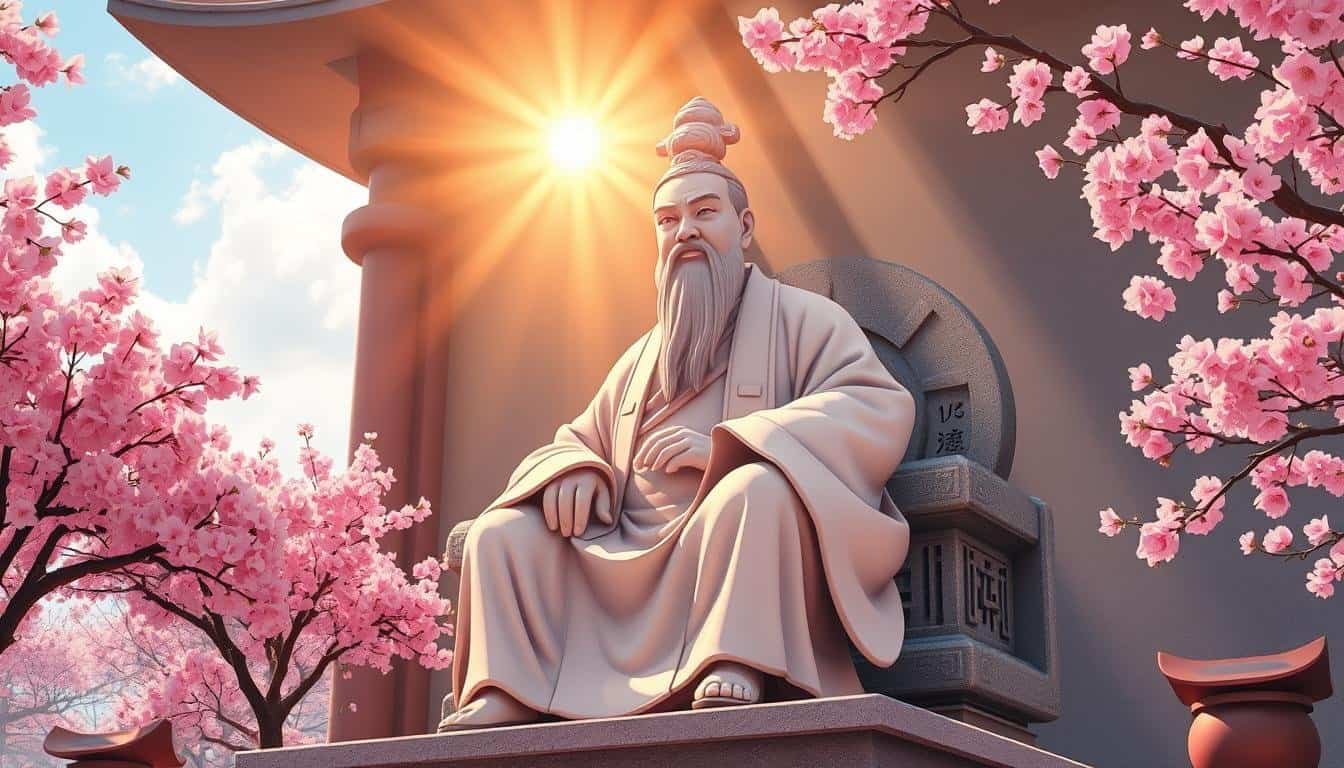Confucius: Morality in Life and Governance
“To put the world in order, we must first put the nation in order; to put the nation in order, we must first put the family in order; to put the family in order, we must first cultivate our personal life; we must first set our hearts right.” – Confucius
Ancient Chinese wisdom still shapes our view of leadership and ethics today. Confucius, a key figure, has taught us for centuries. He was born in 551 BCE in Qufu, China, during a time of big changes known as the Spring and Autumn Period.
Confucius’s teachings guide us on how to lead and live morally. His ideas focus on ren (benevolence) and the power of education to build good character. His famous rule, “do not do unto others what you would not want others to do unto you,” shows his ethical way of life and leadership.
Even though Confucius lived over 2,500 years ago, his thoughts on ethics are still important today. His teachings, found in the Lunyu (Analects), motivate people and leaders to live and lead ethically. Let’s dive into Confucius’s life and teachings to find wisdom for our complex world.
The Life and Times of Confucius
Confucius was born in 551 BCE near Qufu in eastern China. He lived during the Spring and Autumn Period, a key era in Chinese history. This era was filled with political turmoil and social change. These events deeply influenced his philosophy and teachings, which still shape East Asian thought today.
Historical Context: Spring and Autumn Period
The Spring and Autumn Period (770-481 BCE) was a time of decline for the Zhou dynasty. It was an era of smaller states fighting for power. This created a perfect setting for new ideas and philosophies to emerge. Confucius became a major figure, sharing his thoughts on moral leadership and social order.
Confucius’s Family Background and Early Life
Confucius was born into a noble clan known for its modesty and ritual expertise in the state of Lu. Despite his noble family, he faced early hardships. These challenges likely shaped his later teachings on virtue and moral behavior.
Confucius as Teacher and Philosopher
Confucius spent his life teaching and philosophizing. He drew in many students, with some reports saying he had about 3,000 by the time he passed away in 479 BCE. His teachings focused on ethics, rituals, and how to govern morally. He emphasized self-improvement and personal growth.
| Aspect | Details |
|---|---|
| Birth Year | 551 BCE |
| Birthplace | Near Qufu, Eastern China |
| Historical Period | Spring and Autumn Period |
| Main Teachings | Ethics, Rituals, Moral Governance |
| Death Year | 479 BCE |
Confucius’s life and teachings have deeply influenced Confucian philosophy. This philosophy has shaped Chinese history and culture for over two millennia.
Confucian Philosophy: Core Principles
Confucian ethics are key to a philosophy that has guided Chinese culture for thousands of years. At its heart, it focuses on building moral character through virtue ethics. It teaches five main virtues: ren (benevolence), yi (righteousness), li (propriety), zhi (wisdom), and xin (integrity).
Ren is seen as the most important virtue. It means being kind and compassionate. Confucius thought ren was so vital that one would give up their life to save another. This shows Confucian belief in humans’ ability to become better.
Li is vital for how we interact with others and keep society in order. It includes following rules of conduct, rituals, and manners. Confucius said a society that follows li is key for showing true ren.
“To practice five things under all circumstances constitutes perfect virtue; these five are gravity, generosity of soul, sincerity, earnestness, and kindness.” – Confucius
Yi, or righteousness, is about doing what is morally right. It’s different from Western ethics because it values actions for their inherent rightness, not just their outcomes. This helps people know and act on what is morally right.
The junzi, or gentleman scholar, is the ideal of Confucianism. They improve themselves and learn constantly. This shows how Confucianism sees personal growth as key to a better society.
The Concept of Ren: Humanity and Benevolence
Ren is a key Confucian virtue that means being kind and caring. It’s about being a good person and treating others well. This idea guides how we act morally and ethically.
Defining Ren in Confucian Thought
Ren (仁) is about being truly good at heart. It’s about loving your family, protecting them, and helping others grow. Confucius said it’s about wanting to help others while also improving yourself.
This idea is not just for personal relationships. It’s about helping everyone in society for the greater good.
Practical Applications of Ren in Daily Life
Ren shows up in our daily actions as kindness and respect. It means saying what you mean and doing what you say. It’s about following traditions and being true to yourself and what’s right.
These actions are the core of being ethical in Confucian teachings.
“The benevolent man helps others to establish what he himself wishes to establish, and helps others to achieve what he himself wishes to achieve.” – Confucius
Ren as the Foundation of Moral Governance
In Confucian politics, Ren is very important. It’s the key to good leadership, as rulers should be kind and fair. Confucians believe that leaders should put their people first.
| Aspect | Significance in Confucian Thought |
|---|---|
| Nature of Ren | Innate, universal human quality |
| Personal Development | Cultivation of virtue and ethical behavior |
| Social Impact | Promotion of harmony and flourishing communities |
| Political Dimension | Foundation for just and benevolent governance |
Confucius: Morality in Life and Governance
Confucian ethics are key to Chinese moral philosophy. They guide personal behavior and governance for centuries. At the heart, Confucianism teaches the importance of self, family, and society for a peaceful world.
Ren (仁) is a central idea in Confucian thought. It means being kind, compassionate, and humane. Li (礼) focuses on proper rituals and social order in both personal and public life. These values help people become morally excellent and support good leadership.
Confucius thought leaders should set a moral example, not use force. This idea shaped Chinese governance for many years. It shows that personal goodness helps everyone in society.
“To put the world in order, we must first put the nation in order; to put the nation in order, we must first put the family in order; to put the family in order, we must first cultivate our personal life; we must first set our hearts right.”
This philosophy calls for a lifelong effort in self-improvement and moral growth. By building virtues like compassion and integrity, people can help create a peaceful society. Today, Confucian ethics still evolve, facing new moral issues while keeping their essential values.
The Role of Ritual in Confucian Ethics
Confucian rituals are key to moral behavior and social peace. They are called li (propriety) and are central to Confucian teachings. These rituals guide how we act every day and keep society in order.
Importance of Li in Confucian Philosophy
Li means all the social rules for how we interact with each other. Confucians think that societies with rituals do well. They say that people who follow rituals are different from animals.
Rituals as a Means of Social Harmony
Confucian rituals help bring people together. They set rules for respectful behavior and understanding. By doing these rituals, people learn to handle social situations smoothly and think of others.
Balancing Ritual and Sincerity
Rituals are important, but so is being sincere. It’s about balancing what we do outside and what we feel inside. This way, rituals show our true values and beliefs, not just as empty actions.
Over time, there have been different opinions on rituals. Some, like Zhu Xi, saw them as a way to teach. Others, like Tang Junyi, thought being kind was more important than following rituals closely. This shows how Confucian ethics change with society.
Confucian Views on Family and Social Order
Confucian family values are key in Chinese society. They focus on filial piety, keeping the family together, and a clear social order. A study looked at 289 Chinese college students to see how these values affect their views on divorce.
The study used scales to measure filial piety. It found two main types: reciprocal and authoritarian. These, along with family harmony and gender views, shaped students’ opinions on divorce.
Filial piety goes beyond just family. It affects how well kids adjust and do in school in Chinese culture. This idea also helps create a social order. It teaches respect for elders and those in charge.
| Confucian Value | Impact on Society |
|---|---|
| Filial Piety | Shapes family dynamics and respect for authority |
| Family Harmony | Promotes social stability and cohesion |
| Social Hierarchy | Defines roles and responsibilities in society |
Confucius supported his teachings, but there’s debate on the family-state analogy. Joseph Chan questions if classical Confucianism really saw the state as a family. This view gives a deeper look at Confucian impact on Chinese governance and social order.
The Ideal of the Junzi: The Gentleman Scholar
Confucian philosophy focuses on the junzi, or Confucian gentleman. This ideal is the highest level of moral growth and virtue ethics. Confucius changed the term junzi from just for princes to mean someone with top moral behavior.
Characteristics of the Junzi
The junzi is different from the xiaoren (petty person) in how they act and adapt. Five key virtues make up the junzi:
- Benevolence/humaneness
- Righteousness/appropriateness
- Propriety/harmonious differentiation
- Wisdom/knowledge management
- Trustworthiness/integrity
The Junzi’s Role in Society and Governance
In Confucian thought, the junzi is key in society and leadership. This ideal affects not just personal behavior but also business. Companies like Vitasoy follow junzi values by making affordable, healthy soymilk instead of dairy.
Cultivating Virtue to Become a Junzi
To be a junzi, one must always work on getting better through learning and doing. Confucius stressed the role of education in building good character. This focus on virtue ethics changed Chinese society, affecting civil service exams in the Tang and Sung Dynasties.
| Era | Confucian Influence |
|---|---|
| Zhou Dynasty (1046–256 BCE) | Origins of Confucian philosophy |
| Han Dynasty | Confucianism declared state religion |
| Tang and Sung Dynasties | Civil service exams based on Confucian texts |
Confucian Influence on Chinese Governance
Confucianism has been a big part of Chinese politics for over 2,000 years. Emperor Wudi of the Western Han Dynasty made it the official way of thinking. This old wisdom has shaped how China was ruled for many dynasties.
The Confucian way of ruling is all about being virtuous, kind, and just. It teaches people to live in harmony with nature and follow natural laws. This way of ruling focuses on doing what’s right and keeping the universe in balance.
Confucianism’s reach goes beyond China. It has influenced how people act and interact in East Asia for centuries. It has touched Korea, Japan, and Vietnam, deeply affecting their spiritual and political lives.
“The superior man thinks of virtue; the small man thinks of comfort.”
Meritocracy is a big part of Confucian governance. The imperial exam system, based on Confucian teachings, helped bring talented people into power. It was all about picking officials based on their smarts and morals, not their family or money.
Even today, Confucian ideas still shape Chinese politics. The government sees itself as working towards socialist goals. It mixes ancient wisdom with modern ways of ruling.
Conclusion
Confucius’s teachings have deeply influenced East Asian cultures. His ideas on ethics and leadership still shape societies in China, Korea, Japan, and Vietnam. For over 2,500 years, his philosophy has tackled today’s moral and social issues.
Confucianism spread far from China, seen in places like Hanoi’s Temple of Literature, built in 1070. In Japan’s Edo period and Korea’s Joseon Dynasty, Confucian values became key. This shows how powerful Confucian thought is.
Today, Confucianism’s six core values guide us. They are humanity, righteousness, harmony, courtesy, loyalty, and honesty. These values help us lead ethically in a complex world. Even as some ideas change, Confucian principles still lead us towards a better society.
Source Links
- Confucianism
- Confucius
- Confucius | Biography, Teachings, & Facts
- Confucius | Internet Encyclopedia of Philosophy
- Who was Confucius?
- The Main Concepts of Confucianism
- Confucianism
- Ren (philosophy)
- Ren | Chinese Virtue of Humanity
- Government in Confucian teachings
- Confucianism and Moral Ethics
- Confucius on Good Government, the 6 Steps to a Harmonious Society, and Self-Discipline as the Key to Democracy
- Microsoft Word – Angle, Neither Morality Nor Law FINAL.docx
- Chinese Ethics
- The Relationships between Confucian Family Values and Attitudes toward Divorce in Mainland China: An Exploratory Study
- Confucius on the family as model
- Junzi | Confucianism, Morality & Self-Cultivation
- Junzi virtues: a Confucian foundation for harmony within organizations
- The confucian concept of “Governance” and its contemporary value1
- Confucianism | Meaning, History, Beliefs, & Facts
- The Way of Harmony and Strategy: Exploring the Relevance of Confucius Thinking in Asian Societies and International Relations







